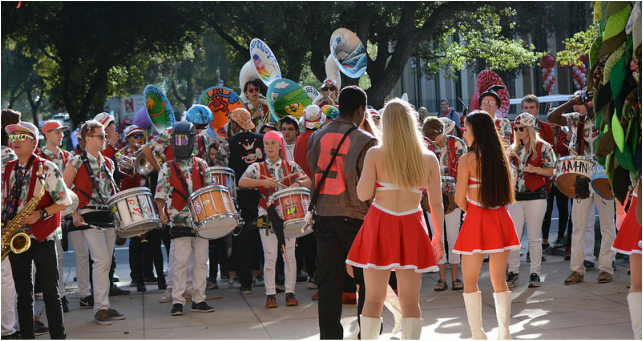Stanford Administration Squashes Students' Scientific Curiosity, Encourages Binge Drinking12/2/2016
Stanford has a drinking problem.
Last year, according to an op-ed by Vice Provost Greg Boardman, Stanford had over 60 emergency transports, 95% of which involved hard alcohol. Stanford president Marc Tessier-Lavigne recently told me that Stanford has developed a strong culture of peer pressure when it comes to drinking and hooking up.
Meanwhile, the Stanford Marching Band, or LSJUMB, has been actively working to change their culture to be less alcohol-driven and more inclusive. They've policed their own language, self-imposed their own alcohol restrictions -- and have begun focusing on planning social events that don't involve alcohol, including outings to the movie theater and the San Francisco Exploratorium. Oh, wait. Stanford doesn't want to let the band "travel" to San Francisco (it's a 30-minute drive or a 50-minute train ride)... so instead of spending their Thursday night learning about science, they're going to stay on campus and... drink? The band recently "traveled" to San Francisco to perform at an AIDS benefit -- which, oddly, the administration had no problem with. (It has been suggested that perhaps this was in an effort to avoid the headline, "Stanford Administration Doesn't Allow LSJUMB to perform at AIDS Research Benefit.") Everything went as planned, without incident. Obviously, the hypocrisy annoys me. But what really bothers me, as a psychologist and play expert, is that part of the reason today's young adults are so prone to binge drinking is because they don't have good leisure and social skills. I recently explained to Stanford administrators that between busy schedules, the ease and availability of passive entertainment, and the trend in “helicopter parenting,” free play has all but disappeared in many of today’s youth. Hufferth and Sundberg (2001) have shown that between 1981 and 1997, free play in children decreased by over 25%; Murphy (2005) writes that children aged 3-11 lost 12 hours per week of unstructured free time in this same time period. Beyond the effects this has on young people’s social, emotional and physical development, one area that has received much less attention is how the disappearance of childhood play – especially among high-achieving youth -- affects leisure skill development. My 2010 master’s thesis demonstrated that playfulness is not a trait, but a skill. Although almost every Stanford student who participated in my study reported a high desire to play, they claimed biggest obstacle to achieving satisfactory levels of recreation (other than school work) was, “There’s nothing to do on campus” – even though Stanford spends millions of dollars per year funding programs, events, clubs and activities for undergraduates. Research on adult boredom proneness revealed positive correlations between boredom proneness and substance abuse (Rupp & Vodanovich, 1997), depression and anxiety (Ahmed, 1990; Vodanovich, Verner & Gilbride, 1991), coronary-prone/Type A behavior patterns (Kass & Vodanovich, 1990) and low self-esteem (Yang & Guo, 2011). Other studies showed a link between boredom proneness and aggression (Rupp & Vodanovich, 1997; Dahen, 2004), anger (Rupp & Vodanovich, 1997), procrastination (Vodanovich & Rupp, 1999), and shyness (Maroldo, 1986). Boredom proneness also correlates with two of the four dimensions on the Sensation Seeking Scale: Disinhibition (i.e., drinking, drugs, parties) and Boredom Avoidance (i.e., staying active to avoid feeling bored, rather than to have an experience). We all know why excessive disinhibition is bad. But it's worth noting that when students practice boredom avoidance, as opposed to adventure- and experience-seeking, they are typically driven by fear and anxiety, and when they get what they want, they feel relief. When people do things because they intrinsically want to (like, say, go to the Exploratorium), they're driven by a desire to see, feel, learn, or succeed -- and when they achieve it, they feel joy. Feeling joy makes us healthy. Feeling stress and anxiety makes us sick and depressed. So in this story, we have a group of students who wanted to organize a fun, off-campus event, during which they could learn and bond and experience joy. But then Stanford was like, "No. We want you to stop drinking and talking lewdly. But we're not willing to let you organize social events that have something other than alcohol as the primary activity." Very short-sighted, Stanford. Do better.
2 Comments
Zane
12/3/2016 03:11:00 pm
Did the administration just not want to pay for it or something? Was there some other reason?
Reply
12/4/2016 10:27:35 pm
The administration wouldn't have been paying for it - the band has its own budget, and probably students would have paid for their own admission.
Reply
Leave a Reply. |
About the Author

Eva is a content specialist with a passion for play, travel... and a little bit of girl power. Read more >
Want to support The Happy Talent? CLICK HERE!
Or Find me on Patreon!
What's Popular on The Happy Talent:
Trending in Dating and Relationships:
What's Popular in Science: Playfulness and Leisure Skills:
Popular in Psychology and Social Skills:
Categories
All
|



























 RSS Feed
RSS Feed